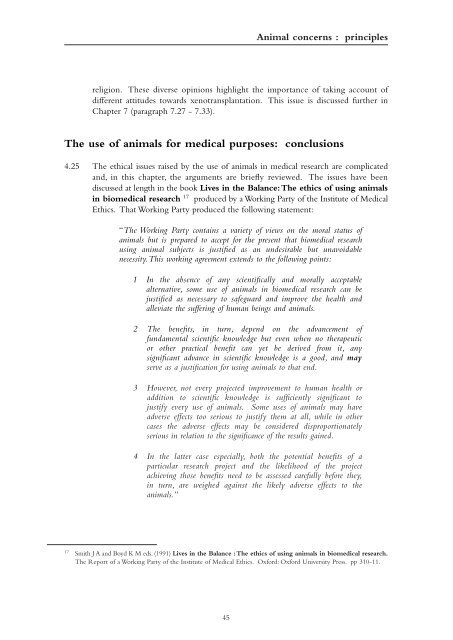Xenotransplantation - Nuffield Council on Bioethics
Xenotransplantation - Nuffield Council on Bioethics
Xenotransplantation - Nuffield Council on Bioethics
Create successful ePaper yourself
Turn your PDF publications into a flip-book with our unique Google optimized e-Paper software.
Animal c<strong>on</strong>cerns : principles<br />
religi<strong>on</strong>. These diverse opini<strong>on</strong>s highlight the importance of taking account of<br />
different attitudes towards xenotransplantati<strong>on</strong>. This issue is discussed further in<br />
Chapter 7 (paragraph 7.27 - 7.33).<br />
The use of animals for medical purposes: c<strong>on</strong>clusi<strong>on</strong>s<br />
4.25 The ethical issues raised by the use of animals in medical research are complicated<br />
and, in this chapter, the arguments are briefly reviewed. The issues have been<br />
discussed at length in the book Lives in the Balance:The ethics of using animals<br />
in biomedical research 17 produced by a Working Party of the Institute of Medical<br />
Ethics. That Working Party produced the following statement:<br />
“The Working Party c<strong>on</strong>tains a variety of views <strong>on</strong> the moral status of<br />
animals but is prepared to accept for the present that biomedical research<br />
using animal subjects is justified as an undesirable but unavoidable<br />
necessity.This working agreement extends to the following points:<br />
1 In the absence of any scientifically and morally acceptable<br />
alternative, some use of animals in biomedical research can be<br />
justified as necessary to safeguard and improve the health and<br />
alleviate the suffering of human beings and animals.<br />
2 The benefits, in turn, depend <strong>on</strong> the advancement of<br />
fundamental scientific knowledge but even when no therapeutic<br />
or other practical benefit can yet be derived from it, any<br />
significant advance in scientific knowledge is a good, and may<br />
serve as a justificati<strong>on</strong> for using animals to that end.<br />
3 However, not every projected improvement to human health or<br />
additi<strong>on</strong> to scientific knowledge is sufficiently significant to<br />
justify every use of animals. Some uses of animals may have<br />
adverse effects too serious to justify them at all, while in other<br />
cases the adverse effects may be c<strong>on</strong>sidered disproporti<strong>on</strong>ately<br />
serious in relati<strong>on</strong> to the significance of the results gained.<br />
4In the latter case especially, both the potential benefits of a<br />
particular research project and the likelihood of the project<br />
achieving those benefits need to be assessed carefully before they,<br />
in turn, are weighed against the likely adverse effects to the<br />
animals.”<br />
17<br />
Smith J A and Boyd K M eds. (1991) Lives in the Balance :The ethics of using animals in biomedical research.<br />
The Report of a Working Party of the Institute of Medical Ethics. Oxford: Oxford University Press. pp 310-11.<br />
45
















